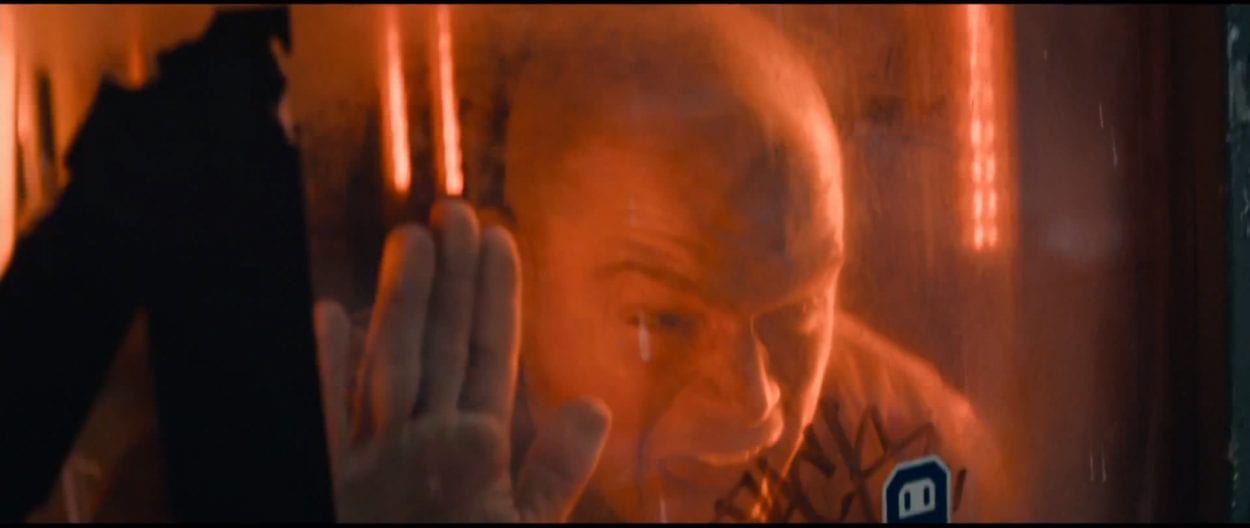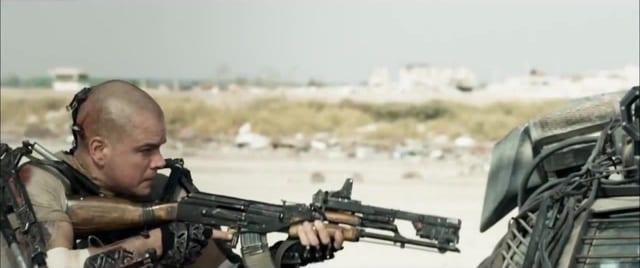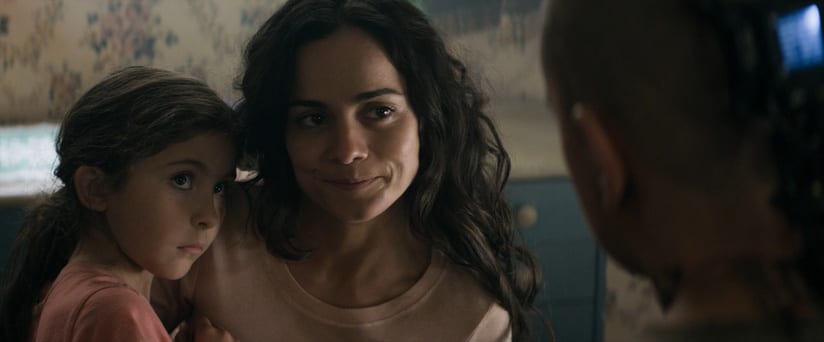I felt with the current state of affairs around the globe and the focus on social injustice that there was no better time to turn my attention to Niall Blomkamp’s Elysium. Just like in each of the other Blomkamp helmed movies, it focuses on social and political issues wrapped up in the guise of science fiction. In District 9, which I will talk more about in the coming weeks, Blomkamp uses the apartheid era, South Africa, as his inspiration. In Chappie, he speaks about the privatization and militarization of civilian policing.
In this outing, Blomkamp has turned the light of his attention on social issues like immigration, health care, the expandability of the modern workforce, and the disparity of wealth between the elites and the rest of us. That aforementioned disparity has never been so great than in the world that the characters of Elysium call home. Set in the year 2154, in a world where the rich have left the surface of the Earth, building themselves a literal garden of Eden, to live amongst the clouds, ever healthy, never aging, living like deities peering down from on high as the rest of Earth scrapes and scrambles for whatever leftovers they can get their hands on.
The gap between the haves and have nots of this worlds is vast and without bridging. The few live in the lap of luxury while the many eke out an existence on a barren and harsh world. This cruel way of life is no better exemplified than through the life of Elysium’s protagonist Max Da Costa (Matt Damon.) The ex-con line worker’s journey from a hardened criminal to a blue-collar worker is one that many know all too well. We see from minute one that this world is desolate, without hope except for the constant reminder of what might have been just hovering above their heads in the sky.

We follow Max as he sets about his day in the futuristic ruins of Los Angelas, immediately we are made starkly aware of the harshness of not just the world but the people who run it and enforce its rule. While waiting for a bus Max is set upon by some droids (robotic police force), the warrantless search of his belongings is quickly partnered by vicious and swift police brutality. The coldness of the mechanical lawmen is, unfortunately, something of a not so subtle but yet extremely accurate portrayal of the all too often used methods by modern-day police.
Especially against people of color or ex-cons, many of the latter wants nothing more than to move on from their past and create a new life for themselves. It is a strong indictment from Blomkamp on how he views the authorities and their heavy-handed tactics. I’m sure his youth spent in South Africa colored his view and mindset when it comes to the issue of policing. The attack on Max leaves him with a broken arm and an appointment with his parole officer, which in turn leads him to be late for his factory job at Armadyne.
When he finally manages to get to his job, he is docked pay, showing us the further consequences of the unwarranted police intervention. Max takes his place working on the assembly line when a pallet becomes stuck, causing the machinery to malfunction. He brings this to the attention of his supervisor who threatens his dismissal if he does not go inside the machine to free the obstruction, even though the machine in question uses high dosages of radiation in its manufacturing process.
Feeling he is without options, Max takes the plunge, which results in him becoming trapped in the machine and thus taking a deadly dose of radiation. This whole interaction is unfortunately all too emblematic of the impression corporations have of the working-class and how expendable they view them. Max is considered to be nothing more than a tool for a job, and when that tool becomes damaged, they just throw him on the scrap pile of humanity. In this case, Max is given five days to live and sent on his way with a prescription of medicine to ease his pain.

The way he is dealt with is a perfect example of the modern throw-away culture, everything and everyone is disposable. If they have no use for you then you are of no use to them, making you useless and antiquated. Max is forgotten about and tossed aside, his work is of no import if he can not continue it, past labors are weighed up against future worth and they never balance the scales when it comes in terms of corporate calculation. The only value they put is on what you can give and not what you have already given.
Now left to fend for himself, Max has to fight against all the odds in a race against time to try and get up to Elysium so he can use one of the Med-Bbays to heal himself of his fatal injuries. It is this quest of his that will shake up the landscape of his world with a seismic shift in social consciousness. In the first steps of his journey, Max is forced back into the open arms of his former associate Spider (Wagner Moura.) The fact that Max is left with no choice but to backstep into his old criminal ways is something that many ex-cons have had to deal with, finding life on the outside filled with understanding and opportunity few and too far between.
After linking back up with Spider, Max and he hatch a plan to run a data heist on one of the elites from Elysium. Max targets the head of Armadyne, John Carlyle (Will Fichtner) believing he is the key into the space station. This is when Max is given the exoskeleton from Spider to allow him the physical ability not only to pull off the heist but also to make it to Elysium. The following sequences give us all a very clear reminder that Blomkamp’s talents don’t just lie in the realms of futuristic social commentary.

When Max and his crew consisting of his friend Julio (Deigo Luna) and a few of Spider’s men assault Carlyle’s ship, we see Blomkamp’s talent for raw and brutal action. Their attack draws the attention of the soldier villain of the piece Kruger (Sharlto Copley.) The gun battle that ensues is fierce and fast-paced; it is another excellent showcase of the aesthetics and unique technology that Blomkamp often deploys in his movies.
He loves to pair a down and dirty, lived-in world with cutting edge technology, a clear juxtaposition of the modern landscape. How many times the poorest of people don’t have three square meals a day but yet they have the latest iPhone in their hand. This is a not so subtle nod to how a lot of our priorities are misaligned, and these worlds are no different. It is little things like this that add a layer of realism to the fantastical worlds that Blomkamp manifests.
During the heist Max downloads the data through the hardware in his exoskeleton, not knowing the depths or importance of the information that he now finds himself in possession of. Max has unwittingly stumbled into the middle of a coup attempt by Defense Secretary Delacourt (Jodie Foster.) The seeds of which were sewn in an earlier scene when Delacourt used less than savory tactics to bring down a group of Elysium bound transporters from Earth.
This aspect of Elysium’s narrative focuses heavily on immigration and the oftentimes brutishly disproportionate tactics that are deployed against immigrants. Blomkamp does not shy away when it comes to facing this type of subject matter, as I previously mentioned his movies are rife with social commentary. The way Blomkamp puts this part of the story together is very interesting, managing to encapsulate many aspects of the immigrant story all within the tale of one little girl’s battle with leukemia and how her mother will do anything to get her the healthcare she so desperately needs.

It is, unfortunately, a tale as old as time, a single parent is left to struggle against the tide of top-down tyranny. A woman who herself is a healthcare worker can not afford the healthcare that would save her daughter Mathilda’s life. Frey (Alice Braga), like many nurses, is a victim of a healthcare system that does not pay them enough but yet costs an extraordinary amount to avail of. This could be said as another example of how dispensable and underappreciated the lower tiers of any mass workforce is viewed.
Soon Max and Frey’s stories intersect, the two childhood friends are now united in their one goal to reach Elysium. The intertwinement of their narrative arcs is a beautifully poetic and unique love story. Max and Frey are symbolic of the intertwined nature of the two cultures; that being that of American and Latin American cultures. Blomkamp once again uses clever and intimate storytelling to encapsulate a much broader narrative, he so adept at packing every little nook and cranny with meaning and the same can be said for Elysium.
What Blomkamp does in Elysium is what he always does, bringing life to a world that is rough around the edges, almost a living ruins of the world that we know. He creates futuristic, fast, hard-hitting stories that pack every bit of an emotional punch as they do kickass. As I mentioned before his worlds feel lived in, his characters real, their stories resonate with all of us. He manages to make each and every one of his projects feel singular and unique but still have the feeling that they inhabit the same world.
Blomkamp is a true visionary with an excellent ability to tell intimate stories, but on a grand scale, his worlds feel vast but also as if everything is being fought at close quarters. He tells tight-knit stories that move at breakneck speed, while always managing to hit so many narrative beats through his character’s stories. Even though his storytelling can feel a little muddled sometimes, his vision is always crystal clear. Blomkamp is an auteur that wears his influences on his sleeve, using the world he sees around him, then lays a futuristic veneer on top of it and Elysium is a perfect example of this.




